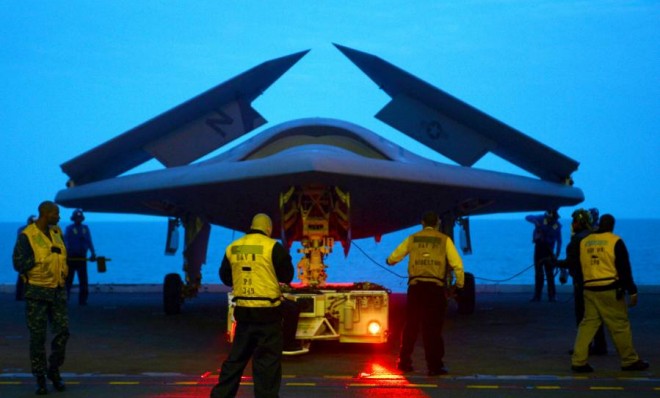INTERVIEW: Robert Greenwald's war on drones
In Pakistan, "people are angry, upset, hurting, grieving. This is not something that makes sense either morally or from a national security point of view."


A free daily email with the biggest news stories of the day – and the best features from TheWeek.com
You are now subscribed
Your newsletter sign-up was successful
Earlier this year, Robert Greenwald, acclaimed director of Wal-Mart: The High Cost of Low Price, turned his lens on the Obama administration's unprecedented war on whistleblowers.
Now his latest documentary is in post-production, and in it he examines America's shadowy and shortsighted drone war. The film is set for release in October, on the anniversary of the death of Tariq Aziz, a 16-year-old boy from North Waziristan remembered by his friends and family for a love of soccer and an interest in filmmaking. Aziz and his 12-year-old cousin were killed in a U.S. drone strike. They are but two of the hundreds of children slain by U.S. missiles in the name of "fighting terror."
Leading up to the film's premiere, Greenwald's production company, Brave New Films, has mounted a guerrilla marketing effort, releasing short issue pieces on the realities and consequences of drone warfare, with special emphasis on so-called "signature strikes," which are missile strikes from drones aimed not at specific terrorists or even known members of terrorist organizations, but rather, "suspicious" people in far-flung areas. (Who can say what malevolent schemes vaporized 3-year-old girls in Pakistan and Yemen had planned?) The whole sordid affair is shocking to the point of disbelief — it seems almost impossible that a sitting president of the United States is an enthusiastic, public supporter of what many have credibly argued is a war crime, and that Congress has abdicated its constitutionally-mandated oversight responsibilities.
The Week
Escape your echo chamber. Get the facts behind the news, plus analysis from multiple perspectives.

Sign up for The Week's Free Newsletters
From our morning news briefing to a weekly Good News Newsletter, get the best of The Week delivered directly to your inbox.
From our morning news briefing to a weekly Good News Newsletter, get the best of The Week delivered directly to your inbox.
The public, meanwhile, has largely been shielded from the realities of drone strikes. The entire program is classified. It's so needlessly secret, in fact, that even the director of the CIA — the man who built the drone program — has called for transparency with regard to the deaths of innocent men, women, and children.
With so much at stake and so little being said or done about it, the responsibility to find and expose the program's failures falls to the press. Journalists such as Jeremy Scahill have done a heroic job pulling back the veil. Now Robert Greenwald has taken up the mantle. If the shocking and heart-wrenching clips released by Brave New Films are any indication, public awareness cannot be raised a minute too soon.
I recently spoke with Robert by telephone, and we discussed drones, terror, and presidential accountability. Here's a (slightly edited) transcript:
What first led you to film a documentary on the drone program?
A free daily email with the biggest news stories of the day – and the best features from TheWeek.com
I was interested and concerned when I started seeing some of the initial articles come out. They were quoting unnamed sources about who we were killing, and we know from previous wars that "unnamed sources" are almost 100 percent inaccurate, and it's abhorrent to me that essentially press handouts were being reprinted. And then when I went to Pakistan and interviewed numerous drone victims, there was no question in my mind that it was a very serious subject and one that was being ignored, and one that lends itself to a film because of the personal, human stories. Not all subjects are meant to be turned into films; some of them are better served with white papers or investigations or news articles. But this is one that has very important human elements to it, and that is where film is very strong.
What is the feeling on the ground based on Pakistanis you spoke with?
I wasn't able to go into the tribal areas because the government and military won't let you in. When I went to Islamabad, I talked to a large number of people, including drone victims who were brought into the city, politicians such as Imran Khan, who's running for president, journalists, psychiatrists. It was very clear that, understandably, people are angry, upset, hurting, grieving, and this was not something that makes sense either morally or from a national security point of view.
What most surprised you about the drone program?
The tremendous inaccuracies, the tremendous number of repeated mistakes from the CIA and the military. The notion of signature strikes profoundly makes no sense. To kill people because they're sitting in a circle — you have no idea who they are, no judge, no jury, no trial — makes no sense. To kill people on a kill list when you don't have firm evidence makes no sense. To kill people when there are no people on the ground providing accurate information makes no sense. We've seen this movie before. Guantanamo was filled with people who were there because of false reporting or because of bribery. And we're seeing similar things happen now with drones. It's about a policy that, even though people deny it, it's a policy based on the idea that we can kill our way to security. That isn't accurate, hasn't been accurate, and won't be accurate.
In spite of everything we know about civilian deaths, including hundreds of children, why does the Obama administration continue to pursue the policy of drone warfare?
The Obama administration doesn't answer our questions, so — I stick with the facts, unlike people in the CIA and others in the White House, so I don't know why they specifically stick with it. Dennis Blair, former director of National Intelligence, who we interviewed, says there's a national security bubble and it is very hard to get other information through. So part of it is the president and his top advisers have been misled and misguided by CIA guys who think they are accomplishing something when they are not. And part of it is this bipartisan agreement that goes on year after year, war after war, death after death, that we're making ourselves more secure by spending billions and billions by occupying, invading, destroying, and droning. All the evidence is in front of us that it is not working. But for some reason, people in high places continue to advocate this policy.
This is one of the few issues where there's no dissent in government, and accordingly, it's moving at a relentless pace in a frightening direction. What can the public do about this?
I think there's an opportunity for us, despite the military-industrial-congressional complex. The opportunity is based on two factors coming together. One is the economic crisis in our country. Each time that there's another story about millions or billions of dollars wasted for so-called security that in fact turns out to be about abuse or profiteering — there's an increased opportunity there to talk about that financial cost and the huge, wasted percentage of our budget, when people can't get healthcare, have homes, or go to college. And on top of that, you have two wars — three wars, actually — Vietnam, Iraq, and Afghanistan — that clearly did not make us any safer. People know it, they feel it, it's in their gut, and the evidence is there. Conventional reporting talks about exhaustion from war. I think it's more than that. I think it's a profound sense that with the suffering, with the deaths, with the families destroyed across the world, that these wars have not made us safer and have not made the countries better. So those factors together, I believe, create an opportunity. Now, the military-industrial-congressional complex is not going to go quietly into the night, so it won't be easy, but I believe the timing does serve us well.
What is the result of the unprecedented secrecy surrounding the drone program?
This really Kafkaesque secrecy where people can't talk about something that everybody knows is happening has resulted in an extraordinary degeneration of democracy. Everything we know about democracy is being challenged. Presidents, officials who aren't elected, officials who are elected, are killing in our name and spending enormous sums of money in our name. And secrecy prevents it from being talked about, and that is a travesty. There is absolutely no justifiable reason that drone strikes, which everyone knows are happening, should be classified. It's absurd. Do you think that bad guys in the tribal areas don't know there are drones? Why? Why is it secret? It only serves the interests of those carrying out the policy.
David W. Brown is coauthor of Deep State (John Wiley & Sons, 2013) and The Command (Wiley, 2012). He is a regular contributor to TheWeek.com, Vox, The Atlantic, and mental_floss. He can be found online here.
-
 Why is the Trump administration talking about ‘Western civilization’?
Why is the Trump administration talking about ‘Western civilization’?Talking Points Rubio says Europe, US bonded by religion and ancestry
-
 Quentin Deranque: a student’s death energizes the French far right
Quentin Deranque: a student’s death energizes the French far rightIN THE SPOTLIGHT Reactions to the violent killing of an ultraconservative activist offer a glimpse at the culture wars roiling France ahead of next year’s elections
-
 Secured vs. unsecured loans: how do they differ and which is better?
Secured vs. unsecured loans: how do they differ and which is better?the explainer They are distinguished by the level of risk and the inclusion of collateral
